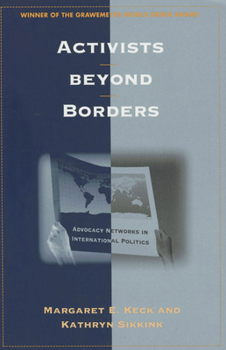Activists Beyond Borders: The Relocation of Jewish Immigrants Across America
Select Format
Select Condition 
Book Overview
In Activists beyond Borders, Margaret E. Keck and Kathryn Sikkink examine a type of pressure group that has been largely ignored by political analysts: networks of activists that coalesce and operate across national frontiers. Their targets may be international organizations or the policies of particular states. Historical examples of such transborder alliances include anti-slavery and woman suffrage campaigns. In the past two decades, transnational...
Format:Paperback
Language:English
ISBN:0801484561
ISBN13:9780801484568
Release Date:April 1998
Publisher:Cornell University Press
Length:240 Pages
Weight:0.80 lbs.
Dimensions:0.6" x 6.1" x 9.1"
Age Range:18 years and up
Grade Range:Postsecondary and higher
Customer Reviews
3 ratings
A voice beyond the mainstream IR theories
Published by Thriftbooks.com User , 22 years ago
Who are the most relevant actors in international relations? The answer is states for both neorealists and neoliberals though the latter also consider some non-governmental organizations and multinational corporations (MNC) as remarkable units in international politics. Constructivists, on the other hand, pay considerable attention to non-state actors while they also keep states as central actors. Margaret E. Keck and, Kathryn Sikkink present us a well-designed discussion about the significance of non-state actors of world politics in Activist Beyond Borders. First of all, they classify transnational actors into three groups; MNC and international banks that have instrumental goals, epistemic communities that insist on causal ideas and transnational advocacy networks (TAN) that carry principal ideas.Then, they analyze the significance of TAN in international politics by searching for how do TAN work and how do they change conceptions of national interest and principles of policies organizations? Keck and Sikkink mention four fundamental strategies of TAN; information politics, symbolic politics, leverage politics, and accountability politics. They generate information, use symbolic elements, put pressure on states and international organizations, and follow their accountability to international norms. Their effectiveness, however, depend on the issue and actor characteristics that they are targeting. What they do? They cause to reformulation of national interests and they eventually change behavior of states. The principled ideas are the key for TAN and they also lead ideas to transformation of states interests and policies. Activist Beyond Borders has three case studies in the area of TAN; human rights, environment, and violence against women. In these cases, transnational human rights advocacy networks changed authoritarian Latin American governments' notions and policies of human rights. TAN in environment shifted the World Bank's funding policies in corresponding to the protection of environment. TAN in women's rights lead to change state policies in two areas. One of the most significant arguments for IR theory that Keck and Sikkink state is that TAN lead to changes in state understandings of sovereignty. Then states begin to accommodate to re-conceptualized sovereignty at the expense of realist notion of absolute sovereignty. In this sense, they question the realist premises of state interests. They also emphasizes that TAN are important source of new ideas, norms and identities that make repercussions over behavior of states and international organizations. They carry transformative and mobilizing ideas into international system and finally shape fundamentally policies of both state and non-sate actors in world politics. In addition, the authors stress upon the importance of domestic actors for TAN to be successful. Overall, Activists Beyond Borders asserts that TAN endeavor to transform the terms and nature of the debate on fundamentals o
Destined to become a classic
Published by Thriftbooks.com User , 23 years ago
Margaret Keck and Kathryn Sikink's "Activists Beyond Borders" is almost certainly the most significant book yet to have appeared on the role of activist networks in shaping global politics. It's a joy to read, theoretically rich but never overly dense, and it's also inspiring -- probably why it received the prestigious Grawemeyer World Order Award. The introduction, on "Transnational Advocacy Networks in International Politics," would make an excellent reading for a graduate course on International Relations theory. But the same could be said for almost every chapter in the book. The case-studies build upon the prior research of both authors to present fascinating overviews of the evolution of activist networks in the fields of human rights, the environment, and violence against women. In each instance, the authors are careful to include examples of networks that did *not* crystallize in certain issue-areas, and to explain why some endeavours succeeded while others failed (or were less successful). While the book will be of considerable interest to I.R. scholars, it should also be read by activists, who will learn a great deal about how to maximize their reach and influence.
A good introduction to international politics
Published by Thriftbooks.com User , 23 years ago
This book provides an excellent introduction to the world of international politics. It has several very detailed chapters exploring such issues as timber logging, for example, and then goes into detail describing how various groups influence the industry.The focus of their book is how "advocacy networks", as opposed to the traditional government agencies, effect change. These advocacy networks work alongside and often against governments in often non-traditional methods to achieve a desired result. In the case of timber harvesting, for example, advocacy networks were unsuccessful in persuading governments to alter their poicies so the organizations within that network focused on the consumers of timber. They successfully exposed the objectionable timber harvesting practices of various companies and enabled consumers to exert pressure on timber harvesting companies to change their practices.





